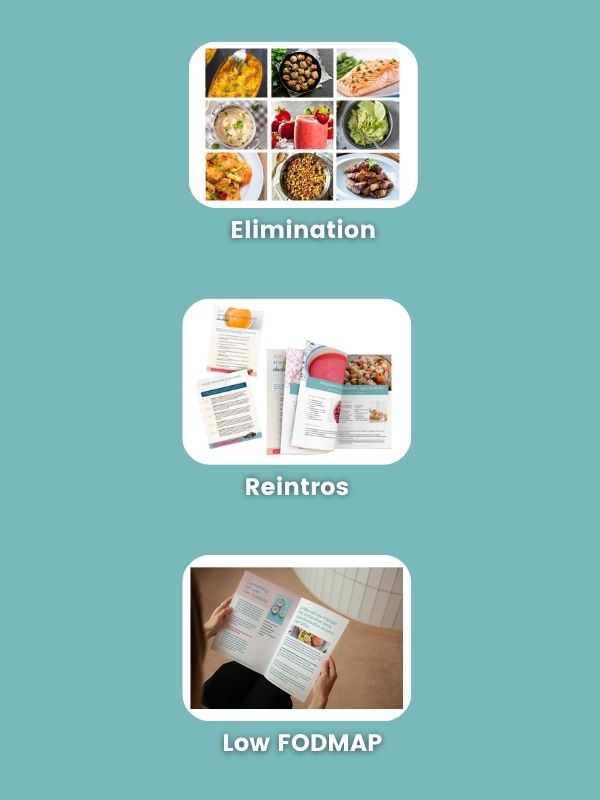Have you heard that the Autoimmune Protocol isn’t effective? Please read this post: “Busting the Myth that the Paleo AIP Doesn’t Work” before you decide for yourself!
Grab your free AIP eBook here – no matter which phase of the AIP you’re on!
The Autoimmune Protocol (AIP) is a dietary and lifestyle approach that aims to reduce inflammation and reverse leaky gut in individuals with autoimmune diseases. It is an extension of the Paleo diet, focusing on nutrient-dense foods while eliminating potential triggers for inflammation.
Despite its popularity, there are still skeptics who question the effectiveness of the AIP. In this blog post, we will debunk this myth by exploring the scientific evidence supporting the AIP and its ability to improve symptoms and lab work in individuals with autoimmune diseases.
This post contains affiliate links and I will be compensated if you make a purchase after clicking on my links.
*Not medical advice.


Key Reason: Leaky Gut
One of the key reasons why the AIP is effective is its ability to address leaky gut, a condition often associated with autoimmune diseases. Leaky gut occurs when the lining of the intestines becomes permeable, allowing undigested food particles, toxins, and bacteria to leak into the bloodstream. This triggers an immune response and can lead to chronic inflammation and autoimmune reactions.
The AIP eliminates common inflammatory foods such as grains, legumes, dairy, processed sugars, and nightshade vegetables, which can contribute to leaky gut. By removing these potential triggers, the AIP allows the gut lining to recover and reduces inflammation.
The Science for Busting the Myth that the Paleo AIP Doesn’t Work
Several studies have shown that the AIP can significantly reduce symptoms and improve lab work in individuals with autoimmune diseases.
One study published in the Journal of Translational Medicine found that following an AIP for 6 weeks led to significant improvements in disease activity scores, quality of life measures, and inflammatory markers in patients with Inflammatory Bowel Disease (IBD) (1).
A study on the AIP for patients with Hashimoto’s thyroid disease stated in its results: “After applying the AIP diet, the number of people reporting symptoms of malaise decreased, the levels of FT3 and FT4 as well as TSH decreased, remaining within the reference concentration range.” (2)
Another study published in Nutrients demonstrated that following a modified Paleo diet for 10 weeks resulted in improvements in fatigue, pain, sleep quality, and overall well-being in patients with Multiple Sclerosis (MS) (3).
These studies provide strong evidence that the AIP can be an effective intervention for autoimmune diseases.

Root Cause Discovery
In addition to reducing symptoms and improving lab work, an elimination diet like the AIP can also help uncover other root cause issues. Many autoimmune diseases have underlying triggers such as food sensitivities, gut dysbiosis, or nutrient deficiencies.
By eliminating potential trigger foods and focusing on nutrient-dense options, the AIP can help someone following the protocol better connect with and “listen to” their body. When we are more in tune with what our body is trying to tell us, we can more accurately identify symptoms and address these root causes.
For just one example, someone following the AIP may discover that they have a sensitivity to most starchy foods, which could be related to a gastrointestinal condition like SIBO (small intestinal bacterial overgrowth) and this dysbiosis may be contributing to their autoimmune symptoms. By temporarily removing these triggers and adopting a SIBO-eradicating protocol, they can experience significant improvements in their health.

Long Term AIP and “Passive” AIP: Two No-No’s for Recovery
It is important to note that staying on the AIP for too long can create the perception that it isn’t working. The AIP is an elimination diet designed to identify trigger foods and recover the gut. Once these triggers are identified and the gut is no longer permeable, individuals can begin reintroducing foods to determine their tolerance levels.
However, some people may mistakenly believe that they need to stay on the strict AIP indefinitely. Furthermore, some people may not yet understand that they also need to be working on root causes of their autoimmunity while they are on the AIP diet.
These two problems above can lead to nutrient deficiencies, oral intolerance, further food sensitivities, worsening symptoms, additional autoimmunity developing, and more. We can see how this can generate the perception that the AIP isn’t effective in managing their autoimmune disease because it “made them feel worse” – when in fact it was the lack of moving forward that triggered a cascade of other preventable problems.
This is not to blame the individual or say that it is their fault! But rather to bring to light that these are common errors due to gaps in the AIP community that can harbor a lack of full understanding of the protocol, its limitations, and its vital adjunct strategies.
It is crucial to work with a healthcare professional or a qualified AIP nutritionist who can guide individuals through the reintroduction phase and root cause mitigation strategies and help them find a sustainable long-term approach.

Thank You for Reading and Helping Me in Busting the Myth that the Paleo AIP Doesn’t Work
In conclusion, the myth that the Paleo AIP doesn’t work is unfounded when considering the scientific evidence and individual success stories. The AIP has been shown to improve symptoms and lab work in individuals with autoimmune diseases by addressing leaky gut and reducing inflammation.
Additionally, it can help uncover other root cause issues such as food sensitivities or gut dysbiosis. However, it is important to remember that the AIP is an elimination diet designed for a specific purpose and should not be followed indefinitely. By working with AIP professionals and adopting a personalized approach, individuals can find long-term success in managing their autoimmune diseases with the AIP.
References:
1. https://www.ncbi.nlm.nih.gov/pmc/articles/PMC5647120/
2. https://www.ncbi.nlm.nih.gov/pmc/articles/PMC6053098/
3. https://pubmed.ncbi.nlm.nih.gov/37772528/





















